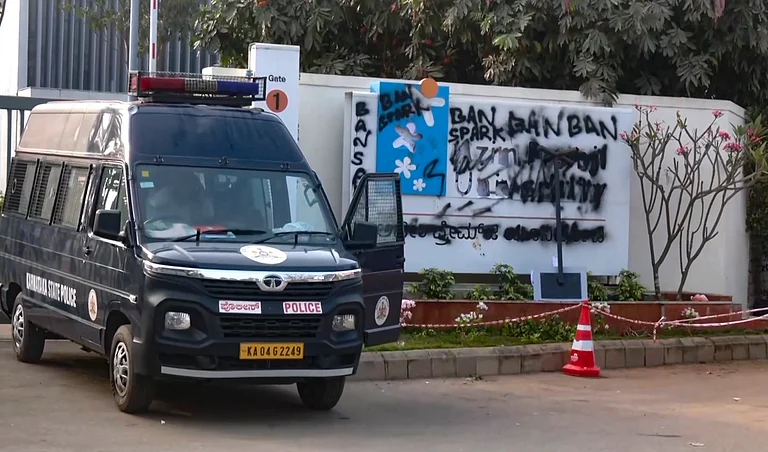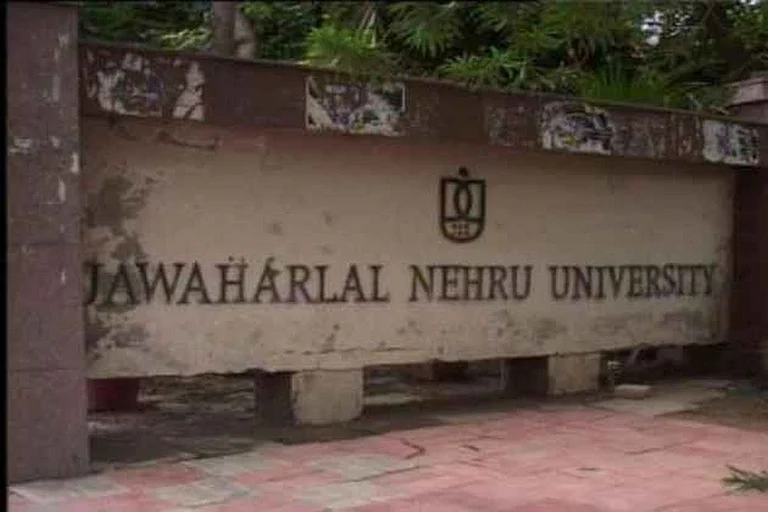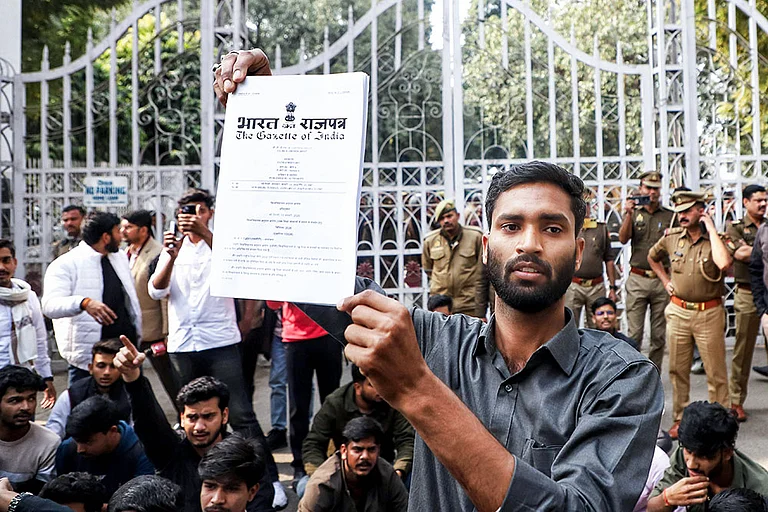“The goons kicked me and punched my face, targeting my head. I fell, but the police just watched. Nobody helped,” Ahammed Rabeeh from Thrissur, Kerala, said. The twenty-one-year Rabeeh―a first year law student at Delhi University’s Law Centre II and the presidential candidate of the Fraternity Movement (FM) for Delhi University’s Student Union (DUSU) Elections this year―walked toward the Faculty of Arts building with a file of nomination papers clutched tightly in his hand.
He never made it inside the building. Before he could submit his papers, he was allegedly surrounded by a large group of men, affiliated with the Akhil Bharatiya Vidyarthi Parishad (ABVP). They slapped, punched, and pushed him to the ground. His nomination papers were snatched, crumpled, and torn. Students and onlookers watched in horror. Police stationed nearby did nothing.
He was contesting the DUSU elections with an ambition nurtured after grassroots activism, community meetings, and classroom discussions.
Rabeeh represents a generation of students who see campus politics not merely as a stepping stone to national power, but as a space for genuine inclusion. “I knew my chances were slim, but I wanted to stand. For my community, even visibility matters,” he said.
He described a hostile campus during election campaigns, stating, “While Jats, Gujjars, Brahmins run massive campaigns and show muscle power, candidates like us are threatened.” Despite arriving on time, Rabeeh couldn’t submit his nomination due to the assault.

“I was not just beaten,” Rabeeh said. “I was told, without words, that Muslims cannot contest here. That our names do not belong on the ballot."
Ashutosh Singh, popularly known as ‘Ashutosh Vidrohi’, 25, founding member of Ambedkar Students’ Association (ASA) and presidential candidate for DUSU elections says, “People know me, that’s why they didn’t tear my nomination or engaged with physical violence, otherwise, the candidates from our party after me, will definitely be treated badly,” on the alleged use of muscle power by ABVP and National Students' Union of India (NSUI).
Singh alleges that he was not given the reason for rejection of his presidential post candidature by the Election Commission (EC). “I was in the EC office the whole day asking why my nomination got cancelled, but I did not get any clarification,” Singh said, adding “and in the evening I was taken out of the facility by the police.”
“Let’s have a debate on student’s topics and forget the money-muscle back-up, then we’ll see who’s the best candidate for the presidential post,” Singh says, questioning the process of elections, which doesn’t give equal opportunities to the students coming from economically weaker backgrounds and marginalised groups to contest election. “They can reject our candidature, but can’t silence our voice,” he added.
Many student wings and candidates across the ideological spectrum raise concern on the process and transparency of elections. A Delhi University (DU) student, on condition of anonymity, says, “I along with many others believe that the ABVP gets a soft hand and support from the election commission whereas smaller student wings faces the rigidness.”
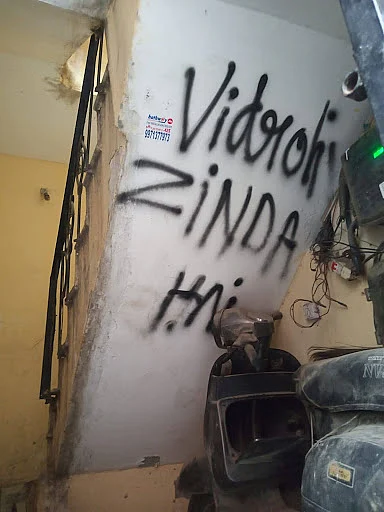
Commenting on the transparency of the election process, biasness and the filing of nominations, Chief Election Officer (CEO), DUSU elections 2025-26, Raj Kishore Sharma says, “People create such impressions out there, but in the election committee as well as in the campus, the discrimination is certainly not the case at all."
“After withdrawal of nominations, those who were not successful with their candidature, were given reasons that do not allow them to contest and it was all done under camera’s surveillance,” CEO Sharma claims, adding, “It is on tape, one can come and check it, we are not hiding anything,” on allegations of not providing reasons for rejection of candidature.
Sharma, acknowledging the news of physical violence with a candidate, raises the question why the student who was beaten up, was admitted to a hospital far away from the north campus. Why did he not file a complaint to the police or report to the proctor? “It sounds fishy to me,” he said.
FM’s Rabeeh says he was taken to Al-Shifa Hospital in Jamia Nagar, which is near the FM National Committee office by the party’s DU campus leaders. “ABVP people were looking for me in the North campus and it wasn’t safe for me and my people to halt anywhere near the campus, so I was admitted in Jamia Nagar,” Rabeeh said, further adding, “I suffered muscle injuries and minor dislocation.”
Saavy, All India Student’s Association (AISA) DU President, believes that in DUSU elections, caste politics comes into play and the people who contest are usually ‘Jats’ and ‘Gujjars’ from privileged economic backgrounds and even both the predominant parties, the ABVP and the NSUI, give tickets keeping caste in mind.
“They’re so scared that these groups do not want students to get the slightest idea that there are alternatives,” AISA President said.
Saavy argues that in elections, they do not see students coming from Uttar Pradesh, Bihar and other places to contest elections, it’s usually Delhi or NCR students. “Our coalition panel of SFI and AISA is diverse and represents general students and marginalised sections,“ she added.
Jitendra Kumar Meena, Assistant Professor of History at Shyam Lal College, says the odds are stacked heavily against students from marginalised backgrounds in DUSU polls. To even campaign across Delhi University’s colleges, he explains, a candidate needs a large team, “which requires a lot of resources, and resources can always be available only to those who have money and children from marginalized communities do not simply have this liberty.” “Here, what matters is not the debate you bring, but how many people walk with you and how many cars follow you,” he notes.
The demographics add another hurdle, most students on campus are from Delhi and NCR, and among them Jats and Gujjars dominate, leaving those from Dalit, Muslim or other marginalised communities at a disadvantage in terms of money, muscle, and sheer numbers. In light of campaigning struggle Meena says, “If you are not from the NSUI or the ABVP, you are not even allowed to campaign inside many colleges, you are not allowed to go inside. This discrimination also happens with marginalised children.” “Either the nomination will be rejected or you will not be allowed to file the nomination. If you try to file the nomination, you will be beaten up or you will not be allowed to campaign.”
Jatin Singh, a third year B.Sc. statistics student and unit minister, ABVP, Ramjas College, responding to allegations that the ABVP thrives on muscle power, caste dominance, and administrative bias, firmly rejected the claims. “Whichever party has more support, people will join to support it,” Jatin said, adding that rivals often mistake their own weaknesses for bias. “The opposing party perceives itself as weak and then levels accusations.”
On charges that the administration tilts in ABVP’s favour, Jatin insisted, “If the Election Commission or professors had been on the ABVP’s side, then every vote given to the NSUI or other parties would have gone to the ABVP. But that’s not the case. These are only allegations.”
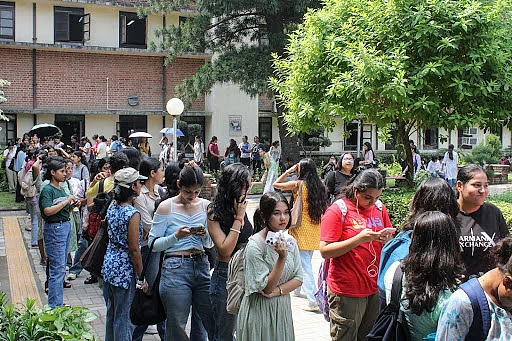
Rejecting the idea that the ABVP is a Jat-Gujjar outfit, he further added, “We proved once again this year that ABVP is a party of student power. It is not about caste. To say marginalised communities don’t join us or are not represented is simply untrue,” pointing to the victory of Deepika Jha, the newly-elected Joint Secretary.
Jatin argued that the ABVP’s strength lies in student support, not intimidation. “We had student power, and the election results showed that they were students, not goons,” the spokesperson said, pointing to the victory of Aryan Maan, Kunal Choudhary and Deepika Jha for the post of President, Secretary and Joint Secretary respectively.
DU witnessed election on September 18, and of the 1.53 lakh registered voters, 60,272 students cast their ballots, pushing this year’s turnout to 39.36 per cent. The figure marks a marginal rise from 2024’s 35.2 per cent, but still falls short of the 42 per cent recorded in 2023.
On September 19, the counting day, Aryan Maan won as President with 28,841 votes, Kunal Choudhary for Secretary with 23,779 votes and Deepika Jha for the post of Joint Secretary with 21,825 votes representing the ABVP in the union and Rahul Jhansla with 29,339 votes bagged the Vice President post in this election and stands alone in the union from the NSUI.
(Views expressed are personal)







